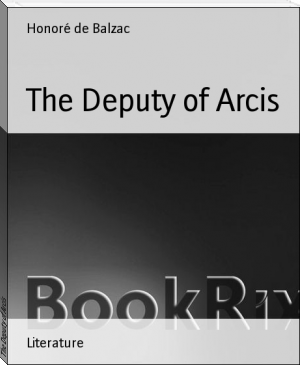The Deputy of Arcis - Honoré de Balzac (little red riding hood read aloud TXT) 📗

- Author: Honoré de Balzac
Book online «The Deputy of Arcis - Honoré de Balzac (little red riding hood read aloud TXT) 📗». Author Honoré de Balzac
"The highest school, monsieur," said the urchin, amazing the four friends with his perfect self-possession.
"What a Figaro!" cried Vinet.
"Mustn't lower one's price," said the infant. "My master calls me a little Robert-Macaire, and since we have learned how to invest our money we are Figaro, plus a savings bank."
"How much do you earn?"
"Oh! some races I make two or three thousand francs--and without selling my master, monsieur."
"Sublime infant!" said Vinet; "he knows the turf."
"Yes, and all gentlemen riders," said the child, sticking out his tongue at Vinet.
Antonin Goulard, ushered by the landlord into a room which had been turned into a salon, felt himself instantly under the focus of an eyeglass held in the most impertinent manner by the stranger.
"Monsieur," said the sub-prefect with a certain official hauteur, "I have just learned from the wife of the innkeeper that you refuse to conform to the ordinances of the police, and as I do not doubt that you are a person of distinction, I have come myself--"
"Is your name Goulard?" demanded the stranger in a high voice.
"I am the sub-prefect, monsieur," replied Antonin Goulard.
"Your father belonged to the Simeuse family?"
"And I, monsieur, belong to the government; that is how times differ."
"You have a servant named Julien, who has tried to entice the Princesse de Cadignan's maid away from her?"
"Monsieur, I do not allow any one to speak to me in this manner," said Goulard; "you misunderstand my character."
"And you want to know about mine!" returned the Unknown. "Well, I will now make myself known. You can write in the landlord's book: 'Impertinent fellow. Direct from Paris. Age doubtful. Travelling for pleasure.' It would be rather a novelty in France to imitate England and let people come and go as they please, without tormenting them at every turn for 'papers.' I have no passport; now, what will you do to me?"
"The _procureur-du-roi_ is walking up and down there under the lindens," said the sub-prefect.
"Monsieur Marest! Wish him good-morning from me."
"But who are you?"
"Whatever you wish me to be, my dear Monsieur Goulard," said the stranger. "You alone shall decide _what_ I am to be in this department. Give me some advice on that head. Here, read that."
And the stranger handed the sub-prefect the following letter:--
(Confidential.)
Prefecture of the Aube.
Monsieur the Sub-prefect,--You will consult with the bearer of
this letter as to the election at Arcis, and you will conform to
all the suggestions and requests he may make to you. I request you
to conduct this matter with the utmost discretion, and to treat
the bearer with all the respect that is due to his station.
The letter was written and signed by the prefect of the Aube.
"You have been talking prose without knowing it," said the Unknown, taking back the letter.
Antonin Goulard, already struck with the aristocratic tone and manners of this personage, became respectful.
"How was that, monsieur?" he asked.
"By endeavoring to entice Anicette. She told us of the attempts of your man Julien to corrupt her. But my little tiger, Paradise, got the better of him, and he ended by admitting that you wanted to put Anicette into the service of one of the richest families in Arcis. Now, as the richest family in Arcis is the Beauvisage family I make no doubt it is Mademoiselle Cecile who covets this treasure."
"Yes, monsieur."
"Very good; then Anicette shall enter the Beauvisage household at once."
He whistled. Paradise presented himself so rapidly that his master said: "You were listening!"
"In spite of myself, Monsieur le comte; these partitions are nothing but paper. But if Monsieur le comte prefers, I will move upstairs."
"No, you can listen; it is your perquisite. It is for me to speak low when I don't want you to know my affairs. Go back to Cinq-Cygne, and give this gold piece to that little Anicette from me. Julien shall have the credit of enticing her away," he continued, addressing Goulard. "That bit of gold will inform her that she is to follow him. Anicette may be useful to the success of our candidate."
"Anicette?"
"Monsieur, it is now thirty-two years since lady's-maids have served my purposes. I had my first adventure at the age of thirteen, like the regent, the great-great-grandfather of our present King. Do you know the fortune of this Mademoiselle Beauvisage?"
"I can't help knowing it, monsieur, for yesterday at Madame Marion's, Madame Beauvisage said openly that Monsieur Grevin, Cecile's grandfather, would give his granddaughter the hotel de Beauseant in Paris and two hundred thousand francs for a wedding present."
The stranger's eyes expressed no surprise. He seemed to consider the fortune rather paltry.
"Do you know Arcis well?" he asked of Goulard.
"I am the sub-prefect and I was born here."
"What is the best way to balk curiosity?"
"By satisfying it. For instance, Monsieur le Comte has a baptismal name; let him register that with the title of count."
"Very good; Comte Maxime."
"And if monsieur will assume the position of a railway official, Arcis will be content; it will amuse itself by floating that stick at least for a fortnight."
"No, I prefer to be concerned in irrigation; it is less common. I have come down to survey the wastelands of Champagne in order to reclaim them. That will be, my good Monsieur Goulard, a reason for inviting me to dine with you to-morrow to meet the mayor and his family; I wish to see them, and study them."
"I shall be only to happy to receive you," said the sub-prefect; "but I must ask your indulgence for the deficiencies of my little household."
"If I succeed in managing the election of Arcis according to the wishes of those who have sent me here, you, my dear friend, will be made a prefect. Here, read these"; and he held out two letters to his visitor.
"Very good, Monsieur le comte," said Antonin, returning them.
"Make a list of all the votes on which the ministry may count. Above all, let no one suspect that you and I understand each other. I am a speculator in land, and I don't care a fig for elections."
"I will send the commissary of police to force you to inscribe your name on Poupart's register."
"So do. Adieu, monsieur. Heavens! what a region this is," said the count, in a loud voice; "one can't take a step without having the community, sub-prefect and all, on one's back."
"You will have to answer to the commissary of police, monsieur," said Antonin, in an equally loud tone.
And for the next twenty minutes Madame Mollot talked of the altercation that took place between the sub-prefect and the stranger.
"Well, what wood is the beam that has plumped into our bog made of?" said Olivier Vinet when Antonin Goulard rejoined them on leaving the Mulet.
"He is a Comte Maxime who is here to study the geological system of Champagne, with a view to finding mineral waters," replied the sub-prefect, with an easy manner.
"Say a speculator," said Oliver.
"Does he expect to get the natives to lay out capital?" asked Monsieur Martener.
"I doubt if our royalists will go into that kind of mining," remarked Vinet, laughing.
"What should you think from the air and gestures of Madame Marion?" said the sub-prefect turning off the subject by pointing to Madame Marion and Simon, who were deep in conversation.
Simon had gone toward the bridge to meet his aunt, and was now walking with her up the square.
"If he was accepted one word would suffice," said the shrewd Olivier.
"Well?" said all the officials when Simon came to them under the lindens.
"My aunt thinks the matter very hopeful," replied Simon. "Madame Beauvisage and old Grevin, who has just gone to Gondreville, were not at all surprised at my proposals; they talked of our respective fortunes, and said they wished to leave Cecile perfectly free to make her choice. Besides which, Madame Beauvisage said that, as for herself, she saw no objection to an alliance by which she should feel herself honored; although she postponed all answer until after my election, and possibly my first appearance in the Chamber. Old Grevin said he should consult the Comte de Gondreville, without whose advice he never took any important step."
"All of which means," said Goulard, point-blank, "that you will never marry Cecile, my old fellow."
"Why not?" said Giguet, ironically.
"My dear friend, Madame Beauvisage and her daughter spend four evenings every week in the salon of your aunt; your aunt is the most distinguished woman in Arcis; and she is, though twenty years the elder, an object of envy to Madame Beauvisage; don't you see, therefore, that they wished to wrap up their refusal in certain civilities?"
"Not to say entire yes or no in such cases," said Vinet, "is to say _no_, with due regard to the intimacy of the two families. Though Madame Beauvisage has the largest fortune in Arcis, Madame Marion is the most esteemed woman in the place; for, with the exception of our chief-justice's wife, who sees no one now, she is the only woman who knows how to hold a salon; she is the queen of Arcis. Madame Beauvisage has tried to make her refusal polite, that's all."
"I think that old Grevin was fooling your mother," said Frederic Marest.
"Yesterday you attacked the Comte de Gondreville, you insulted and grievously affronted him, and he is to be consulted about your marriage to Cecile!"
"Pere Grevin is a sly old dog," said Vinet.
"Madame Beauvisage is very ambitious," pursued Antonin Goulard. "She knows very well her daughter is to have two millions; she means to be mother-in-law of a minister, or an ambassador, in order to play the great lady in Paris."
"Well, why not?" said Simon Giguet.
"I wish you may get it!" replied the sub-prefect looking at Vinet, with whom he went off into a hearty laugh as soon as they were out of hearing. "He won't even be deputy," added Antonin, addressing Vinet; "the ministry have other views. You will find a letter from your father when you get home, enjoining you to make sure of the votes of all the persons in your department, and see that they go for the ministerial candidate. Your own promotion depends on this; and he requests you to be very discreet."
"But who is the candidate for whom our ushers and sheriffs and clerks, and solicitors and notaries are to vote?" asked Vinet.
"The one I shall name to you."
"How do you know my father has written to me, and what he wrote?"
"The stranger told me--"
"The man after water?"
"My dear Vinet, you and I are not to know; we must treat him as a stranger. He saw your father at Provins as he came through. Just now this same man gave me a note from the prefect instructing me to follow in every particular the instructions of Comte Maxime about this election. I knew very well I should have a battle to fight! Come and dine somewhere and we will get out our batteries. You are to be _procureur-du-roi_ at Mantes, and I am to be prefect; but we must





Comments (0)